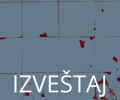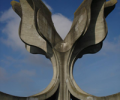Public opinion poll on „The awareness of Serbian citizens about the wars and war crimes of the ‘90s, and war crimes trials“

A survey conducted by the Research and Publishing Center Demostat for the needs of the daily newspaper Danas, for the first time since 2011, presents the views of citizens about war crimes trials before domestic courts and the Hague Tribunal, as well as their views about the opening of archives, regional cooperation of judicial bodies, political rehabilitation of convicted war criminals, compensations to victims and raising of war memorials, and reform of the educational programme, and addresses in conclusion the perception of guilt and responsibility for the crimes committed and the general awareness of citizens about the wars and crimes committed in the ‘90s.
The public opinion poll was conducted in August 2017, using the method of personal “face to face” interviews. The questionnaire contained 69 questions, and 1202 questionnaires were entered into the final statistical analysis. The respondents who participated in the poll were 48% women and 52% men, between the ages of 17 and 75 upwards.
The findings of the poll as conducted indicate that Serbian citizens are not well-informed about the wars of the ‘90s in the former Yugoslavia, or about the war crimes and war crimes trials. 59% of respondents estimate their awareness of war crimes trials as low.
The predominant attitude of the respondents towards the Hague Tribunal is negative, as reflected in allegations of its bias and partiality, numerous objections to the Tribunal’s work, and the attitude that the Tribunal has done little to contribute to the knowledge of the facts about the wars in the former Yugoslavia. However, the citizens of Serbia are also critical of the work of the Serbian state in the conduct of war crimes trials, as well as of the objectivity and impartiality of the War Crimes Prosecutor and judges of the Department for War Crimes. But despite that, there are two and a half times the number of respondents who claim that a fair trial for Ramuš Haradinaj is possible in Serbia than those who claim it is not. A quarter of the respondents think that the Croats committed the most crimes, and nearly half of the respondents think that the Serbs had the highest number of casualties in the wars in the former Yugoslavia.
The vast majority of respondents oppose the political rehabilitation of suspects, prisoners and those convicted of war crimes, whether it is for performing government functions or active participation in political life.
More on these and other findings is available in the report about the opinion poll on „The awareness of Serbian citizens about the wars and war crimes of the ‘90s, and war crimes trials“, available here.









